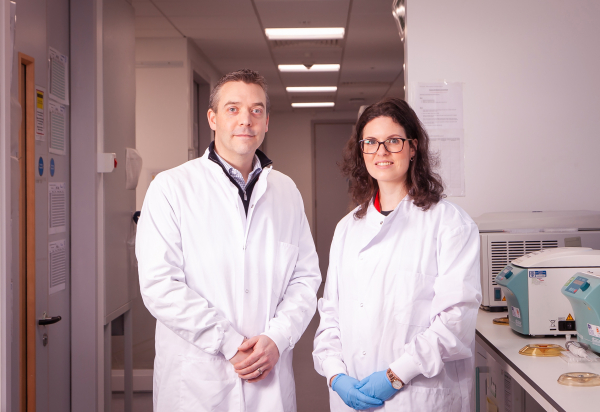
Investing in high-quality, ground-breaking local research is at the heart of what we do, and we are dedicated to advancing the prevention, treatment and care of chest, heart and stroke conditions within Northern Ireland. We have invested almost £9 million into research in local universities and hospitals since 1994, funding treatments, medications, therapies, rehabilitation programmes and cures.
This year we were delighted to fund a piece of research being carried out by Dr. Chris Watson, a lecturer and Principal Investigator, and Dr. Claire Tonry, Postdocotral Research Fellow, at Queen’s University Belfast, which is asking the question, can we develop a lateral flow test to detect Heart Failure?
What is this study about?
Heart failure is a serious condition, where the heart cannot pump blood very efficiently.
Almost 20,000 people across Northern Ireland have been diagnosed with Heart Failure, but it’s likely there are many more undiagnosed, as it shows no symptoms in the early stages.
CLEC3B is a chemical found in heart tissue. In research previously funded by NICHS, we found that this protein plays a role in the development of Heart Failure. We found CLEC3B in the blood, but also in saliva. This is exciting because saliva samples can be tested using lateral flow devices. We have now gained funding from NICHS to confirm these earlier findings and to develop a lateral flow device.
How will you do it?
This study will involved two stages. Firstly, we will work to validate our orginal findings by looking at the CLEC3B protein in blood and saliva samples from patients with Heart Failure from across the UK, Ireland, Italy and Greece. After this we will work to develop and cheap and simple lateral flow test that can be used as a new diagnostic for heart failure.
What difference could this research make?
A reliable lateral flow test for Heart Failure would speed up diagnosis and could even be done at home.
This would be cost effective and a convenient way of detecting whether someone is at risk which is important as Heart Failure usually shows no symptoms in the early stages. Often people don’t seek help until the disease has progressed to an advanced stage and is having a serious impact on them.
These tests could also be used by patients at home to monitor their condition and check if it is getting worse.
Whilst there isn’t a cure for Heart Failure currently, identifying it early will mean getting the right treatment in place early. This will keep the symptoms under control for as long as possible and ensure a good quality of life.
